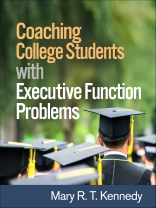Although executive function difficulties are often addressed in school-age children, there are few resources showing professionals how to help these individuals when they are older. This book presents a dynamic coaching model that helps college students become self-regulated learners by improving their goal-setting, planning, time management, and organizational skills. Ideal for use with students with attention-deficit/hyperactivity disorder (ADHD), learning disabilities, acquired brain injury, and other challenges, Mary R. T. Kennedy’s approach incorporates motivational interviewing and emphasizes practical problem solving. User-friendly features include numerous concrete examples, sample dialogues, and print and online resource listings. In a large-size format for easy photocopying, the book contains 21 reproducible forms. Purchasers get access to a Web page where they can download and print the reproducible materials for repeated use.
Tabla de materias
Foreword, Mc Kay Moore Sohlberg
I. Foundations
1. Executive Functions and Self-Regulation
2. College Students with Executive Function Problems
3. Military Service Members and Veterans in College
II. Dynamic Coaching
4. A Dynamic Coaching Approach
5. Information Gathering and Collaborative Planning
6. Coaching Self-Management and Self-Learning: Goals–Strategies–Act–Adjust
7. Coaching Self-Advocacy
8. Coaching toward Independence
Sobre el autor
Mary R. T. Kennedy, Ph D, CCC-SLP, is Professor and Chair of the Department of Communication Sciences and Disorders at Chapman University in Orange, California. She is a certified speech-language pathologist who has worked with individuals with acquired brain injury for many years. Board certified by the Academy of Neurologic Communication Disorders and Sciences (ANCDS), Dr. Kennedy is a Fellow of the American Speech-Language-Hearing Association and a recipient of the ANCDS Honors Award. She has been associate editor and guest editor for peer-reviewed journals on topics related to brain injury. Dr. Kennedy’s research and more than 60 publications have focused on management of cognitive and language disorders after brain injury. Her current work documents common challenges facing college students with brain injury, and validates the usefulness of coaching that explicitly instructs students in self-regulation so as to support executive functions.












